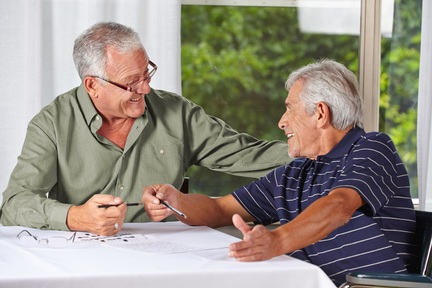Prejudice and stigma sees LGBT elderly suffer poorer care
Lesbian, gay, bisexual and transgender (LGBT) people aged 50+ have worse physical and mental health, poorer access to care and greater isolation and loneliness because of prejudice and stigma.

People in the LGBT community continue to experience poorer care and are more likely to have conditions that negatively impact their health and wellbeing, according to research which reveals homophobia, transphobia and a denial of people’s identity in social care settings.
Care staff may refuse to acknowledge same-sex relationships
Research involving 800 men and 700 women, revealed examples of care staff refusing to acknowledge or miscategorising same-sex relationships. LGBT people also feared expressing their identity and had anxiety over hiding it.
Gay men aged over 50 are more likely to be living with a long-term limiting illness and have lower overall life satisfaction than straight men. They are also more likely to have attempted suicide in their lifetime.
Based on analysis of 24 surveys, the report 'Raising the equality flag: Health inequalities among older LGBT people in the UK', was published by think tank the International Longevity Centre UK (ILC). Dr Brian Beach, senior research fellow at ILC, said: “It is disheartening that in 2019 we continue to see health inequalities between older LGBT people and their heterosexual and cisgender peers.”
“We need to see action now to build on the NHS’s pledge to end discrimination in health and care across the country. We must also enhance our understanding of the needs of the older LGBT community.
"Health and care staff must be trained to ensure that they are not directly or indirectly discriminating against older LGBT people.”
‘Minority stress theory’
The report spoke of ‘minority stress theory’ - in which people from marginalised backgrounds experience long-term stress and poor health because of negative social experiences related to their identity.
Some older LGBT people described challenges in forming new heterosexual networks, difficulties finding common ground or feeling unable to be their 'authentic' selves.
Their risk of loneliness and social isolation also increased, where opportunities for people to socialise with the LGBT community were not available.
Mental health issues, particularly suicide, were identified, especially among transgender and bisexual women and those living in rural areas.
Experiences as victims of violence, aggression and homo/transphobia in daily life outside social care settings, led some people to hide their identities, while anxiety around aggression were particularly felt by transgender people.
LGBT people reported finding it difficult accessing health care that deals with their sexual identity. For gay and bisexual men ageing with HIV, some expressed fear about being the first cohort to age on long-term anti-retroviral therapy.
Different social networks for LGBT people contributed to a greater need for formal care provision (compared to non-LGBT), according to the report, due to not having children or being alienated from family members. In relation to end-of-life care and bereavement, feelings of 'invisibility' and denial of identity were highlighted - with LGBT people saying the loss of their partner was trivialised by care providers.
Poor data risks LGBT people’s health
The research undertaken by University College London (UCL), and Cardiff University, is supported by the Wellcome Trust.
The report recommended better data collection on the health outcomes of older LGBT people and stated: 'it is unclear the extent to which – if at all – local authorities are collecting such information on older LGBT people. Without such information, the needs of this group may be overlooked.' Hospitals do not routinely collect data related to patients’ sexual orientation, which also 'risks the needs of LGBT people being overlooked as they age.'
The ILC is calling for the development of a national standard or quality assurance framework related to equality and diversity training to meet the care needs of older LGBT people.
The report described a prevailing 'tendency' for training of health and care professionals to focus on treating all patients the same rather than recognising the specific needs of different groups” but instead, the report called for “consciously inclusive” efforts by care home and home care organisations, so that older LGBT people feel safe and comfortable.
Latest News
 29-Jul-24
Dementia Bus gives carehome.co.uk staff insight into life with dementia
29-Jul-24
Dementia Bus gives carehome.co.uk staff insight into life with dementia
 01-Mar-24
Find out the top care homes in 2024
01-Mar-24
Find out the top care homes in 2024
 21-Mar-23
UK's top care homes in 2023 revealed
21-Mar-23
UK's top care homes in 2023 revealed
 03-Jan-23
carehome.co.uk launches free care helpline
03-Jan-23
carehome.co.uk launches free care helpline
 13-Dec-22
5 mins with Emily Whitehurst, chief operating officer for Constantia Healthcare
13-Dec-22
5 mins with Emily Whitehurst, chief operating officer for Constantia Healthcare